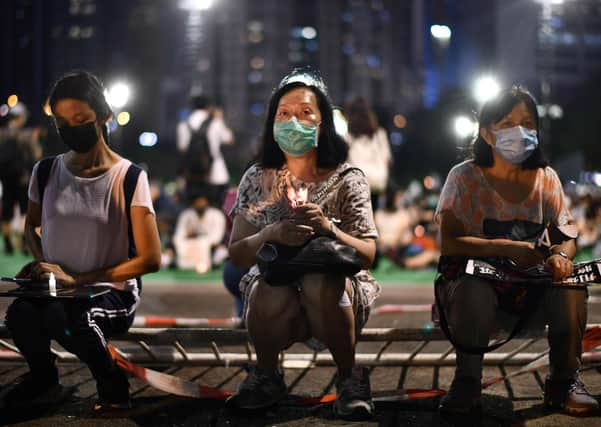Covid calls into question China’s reliability as a leading global power – Marco Vicenzino


The outbreak of the Covid-19 pandemic, emanating from China, ushered in the start of a new historical era that triggered a global economic meltdown. Now, the Chinese Communist Party’s (CCP) imposition of national security legislation on Hong Kong after months of protests marks a historically definitive moment in democracy’s growing demise in the once autonomous global financial centre. However, thousands still defied the order by the CCP officially banning the annual Tiananmen Vigil for the first time in 30 years.
Above all, the CCP’s provocative moves, and the ensuing US response, reinforces the bilateral US-China rupture and formalises the establishment of a new global order that will define the remainder of the 21st century.
Advertisement
Hide AdAdvertisement
Hide AdThese unfolding developments have been years in the making, and were arguably long overdue historically. The overall global political landscape has been largely lingering in flux for the past two decades – particularly when compared to the more rapid emergence and evolution of new global orders in the 20th century. These included the endings of the two world wars, in 1918 and 1945, and the Cold War in 1990.
While the Great Recession of 2008 may have revealed the new geopolitical paradigm’s broad structure, the Covid-19 pandemic exposed its true colours. The unfurling pieces of the current Great Power Competition among nations are falling more clearly into place, while tensions are escalating to new heights.
Unlike the Cold War paradigm, the new geopolitical structure is not marked by a binary US-Soviet divide with clearly defined camps. Friends and foes often cross traditional lines for short-term economic interest, political gain and convenience. Although the US and China constitute the world’s two largest economies, rising regional powers are willing and able to pursue their own local agendas, often against the interests of the world’s top two players.
The bottom line is that the new geopolitics reflects an increasingly complex and fragmented global landscape where uncertainty dominates a far more dangerous world. This is further compounded by a generation of leaders worldwide largely short on long-term vision and strategic thinking.
Within this framework of this new global order, Covid has seriously called into question China’s reliability as a leading global power. Until now, its initial cover-up has resulted in the loss of over 350,000 lives, millions of lost livelihoods and global economic collapse. The China trust deficit is further compounded by the CCP’s aggressive tactics to economically and diplomatically coerce Covid-distressed states into buying China’s pandemic narrative – that of a superior one-party system that effectively confronted and defeated the virus. Thus far, these measures have largely backfired and further undermined China’s credibility and reputation on the global stage.
An alternative and more realistic Covid narrative is that China used repression to cover up the virus and even greater repression to contain it and that, until now, it has been democratic systems that have most effectively confronted the Covid pandemic through transparency and open dialogue with their citizens. Taiwan, South Korea and several of Europe’s Nordic and Central and Eastern European states stand out amongst the various success stories.
China’s attempt to reconstruct its image internationally will not be easy but still very possible in the long term. Armed with vast amounts of cash in a financially distressed world, the CCP is likely to find enough buyers for a new China narrative – no matter how flawed or misleading.
Ultimately, China remains a totalitarian system. Like-minded states will wilfully buy into its policies as it strengthens their own positions internally. While some heavily indebted democratic nations will tread more carefully, others will proceed for the quick cash and its short-term benefits. After all, the long-term threat of China’s debt trap will be a problem for future leaders and generations to deal with.
Advertisement
Hide AdAdvertisement
Hide AdOn the one hand, it is important not to underestimate China’s internal weaknesses and their ability to inhibit the level of China’s leverage abroad. Yet, to a considerable extent these vulnerabilities help fuel China’s determination to exert its influence even more aggressively around the world.
As for the US, its increasing disengagement from the global stage facilitates China’s pursuit of global hegemony. For the US to remain globally competitive and maintain any continued influence, it needs to exercise greater engagement on all fronts with traditional allies and emerging powers – not just with words but real actions. It was a skill the US generally once honed – particularly during the Cold War – that requires continuously adept leadership backed by consistently broad popular consensus. Whether the US has the will or ability to maintain a position of global leadership remains an open question that will be determined in the coming months and years as the 21st century saga continues to unfold.
Marco Vicenzino ([email protected]) is a geopolitical expert and international business advisor to senior executives. He is also a Euromoney Country Risk Expert and member of the International Advisory Council of the Asia Scotland Institute
Comments
Want to join the conversation? Please or to comment on this article.